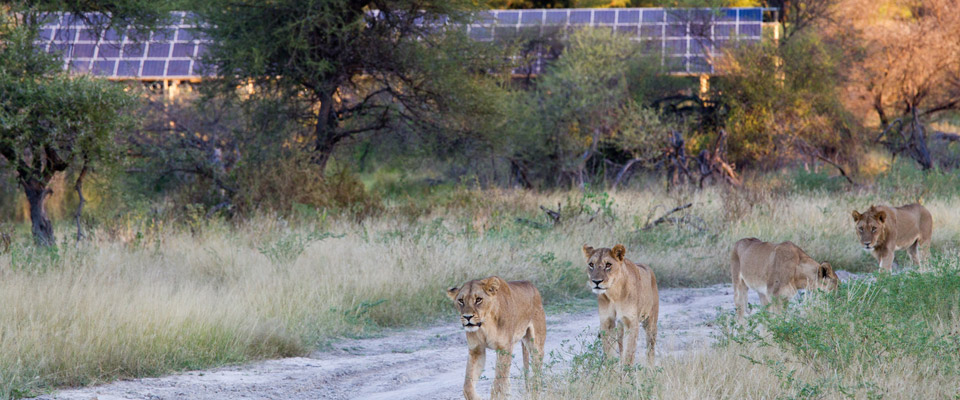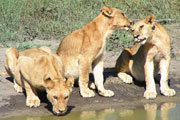Going Green on Safari - 6 Tips for Eco-Travel in Africa
1. Keep your flights to a minimum and offset your carbon footprint
The single largest impact of most leisure trips is the international flights to the destination and back home. If you live in Africa take on the challenge of travelling overland exclusively! If you need to take long flights, then your best option is to offset your carbon emissions. Fly-in safaris also add to the impact of your air travel, so consider alternatives or offset the environmental consequences of the extra flights.
 Green plane by NASA
Green plane by NASA
See more about offsetting in the Smithsonian Magazine article: Can Eco-Conscious Travellers Do Anything To Fly Green?, according to which "buying carbon offsets won't stop global warming, but if you're travelling, it's your best individual option for reducing your carbon footprint."
2. Pick 'green' types of tours
The most responsible travel choice is to select, "places specialising in non-motorised activities like walking, horseback, canoe and cycling safaris which are, by definition, the greenest of the green", as noted by the editor of the Africa Geographic Magazine edition: How Green is Your Safari?.
 Zambezi canoeing safari-2 by Lower Zambezi Camps
Zambezi canoeing safari-2 by Lower Zambezi Camps
The most environmentally conscious tour options are those that focus on non-motorised activities, so if you are serious about reducing your environmental impact then the best is to opt for walking, hiking, cycling, canoeing, kayaking, gorilla trekking and any other 'eco-light' safari activity. These non-motorised options are less fuel intensive and energy guzzling, as well as being less physically intrusive or damaging to the natural habitats that you visit.
That said, several eco-conscious lodges and tour operators have gone to great lengths to operate more sustainably (socially and environmentally), ameliorating the negative effects of driving in the bush to an extent.
3. Stay at eco-friendly lodges and camps
Support the lodges and camps that do good work in terms of reducing their environmental impact, promoting conservation and contributing to social betterment.
Most of the lodges and camps that have made some positive changes in terms of their environmental impacts will of course advertise their efforts. Whether or not the accommodation is as 'green' as it proclaims to be is debatable, but it's a potentially positive shift worth encouraging through compliments or complaints. Check up on the eco-lodges when you visit them - ask questions and look at what they are doing on the ground and behind the scenes! You can help nudge accommodation establishments in the right direction and call them out when they aren't living up to their eco-image.
How do you tell if a lodge is really 'green'?
That's a subject for a small library of its own, but basically you can look at input and output (material and energy flows).
The resources (energy, water, food, building materials etc) that the establishment consumes and the waste (sewerage, grey water, trash, emissions) that it generates. These are some questions that can serve as checkpoints:
- Rubbish / trash: where does the solid waste go and how is it treated? Do they recycle and minimise waste, tapping into material outputs as a resource? What happens to organic waste - is it composted to make fertiliser, used to generate energy from methane gas, or otherwise harnessed?
- Water and air pollution: are they using generators that emit air pollution? Are they feeding sewerage or grey water into the water systems (estuaries, rivers, lagoons, the ocean, lakes), around them? Chemical and fuel intensive processes often result in toxic by-products that pollute the water and air, therefore the more organic and renewable the operation, generally the better.
- Energy and resource efficiency: is the lodge or camp using renewable energy sources (solar, hydro, methane, wind etc)? Are they conserving electricity, water and other resources - using resources wisely or wastefully?
- Direct impacts: is the ecosystem that they operate in being compromised and did they cause extensive damage to the natural habitat when building the lodge or camp? Looking at the impact of activities at the lodge is also important, as energy intensive or destructive activities can create a negative overall impact. Is nature being respected, or is the natural environment (bush, dune, forest and water systems) being degraded, trampled and polluted by the lodge and related human activities (motorised boat cruises, scuba diving on reefs, off-road game drives, quad biking, over-fishing etc)?
 Solar boat by Chobe Game Lodge
Solar boat by Chobe Game Lodge
Then there is the general vibe of the lodge or camp; how they operate on a day-to-day basis and think in terms of conservation, sustainability and social responsibility. You can tell a great deal by observing how the lodge staff are treated and their levels of job satisfaction and awareness about ecological and social matters. Positive indicators include: supporting local businesses and buying local goods; engaging in meaningful community projects in the area; helping to create awareness and educate visitors and locals; using sustainably harvested materials (wood, furniture, construction); participating or running successful wildlife and nature conservation initiatives and choosing organic and fair trade options.
- 6 Affordable Eco-Safaris in Africa - go ‘green’ on a budget - the lodges on these tours are classed as eco-lodges, so take a look to see
4. Watch your step - travel responsibly
Are you eco-savvy? Here are a few points to keep in mind if you want to lighten your individual environmental impact.
- Take as many photos as you like, but leave only footprints and positive contributions
- Stay on the path - tread lightly (literally) in the bush and don't pick indigenous flowers, remove vegetation or feed the animals
- Save power and use water wisely (this is especially important in many parts of Africa where water scarcity is a major issue)
- Walk when you can and share taxis or use public transport - often easiest when exploring in and around towns and cities
- Use biodegradable, non-toxic products (soap, shampoo, insect repellent etc) in the bush
- Avoid non-recyclables and throw-away type packaging as far as possible
- Don't drink bottled water, if you can refill a reusable bottle (check that water is safe for drinking). If you need to buy water then get a large bottle and decant into a reusable bottle to reduce rubbish (and save on costs)
5. Become part of the solution
Researching and choosing your destination with care is a key part of becoming a more responsible traveller. Some natural environments are under pressure from tourism and human activity - the mere act of visiting these vulnerable places can be questionable, if not negligent or outright damaging. If your visit supports organisations, parks and tour operators that are exploiting treasured natural areas, wildlife populations and local communities then you unfortunately join the ranks of the problem.
More ways to make your travels sustainable:
- You can buy green seats on overland trips (ask us when booking)
- Donate to and support reputable conservation and social efforts, instead of giving handouts that encourage begging and dependence
- Choose reputable, conservation-minded tour operators and tourism outfits
- Take a closer look at what is really happening at the lodges
- Spread the message of responsible action and promote ethical travel and sustainable living as you journey
- Going green begins at home, so make sustainable choices wherever you are
- Volunteer at projects that make a difference to local communities and wildlife
 Wildlife volunteering by Wildlife ACT
Wildlife volunteering by Wildlife ACT
6. Boycott unethical operations & report problems
This goes for any lodge you stay at - if you see a destructive practises don't just turn a blind eye.
- A bit of googling before you book and go, can help sort the clean tourism operations from the dirty
- Tell the world about dubious or damaging activities and operations (Twitter, TripAdvisor, Facebook etc - use the power of social media for good!)
- Report false claims and unsustainable practises to watchdog organisations, local authorities, media outlets and regulatory bodies
- Ask questions and don't fall for greenwashing at lodges, camps and wildlife centres
- Avoid animal interactions and captive breeding programs in general (research online before visiting)
- Don't engage in activities that damage the natural environment and kill or harm animals, birds and other creatures
- Think twice before you buy any products, especially those that could be made from threatened or endangered species, including animal hides and body parts, shells, ivory, rare woods or coral. By shopping indiscriminately you could be supporting illegal trade in animal products and placing vulnerable populations under strain.
These six suggestions are by no means an exhaustive guide to greening your travels, but hopefully some of the ideas will come in handy and provide a gauge for forging a responsible path for travellers and tourism operators in Africa.
Take a look at this eco-travel guide by WWF: Have an environmentally friendly vacation - it's an excellent resource for ideas and considerations.
As environmental writer David Bristow says:
Ecotourism is a nature based experience, around a strong conservation ethic supporting the local population. These are the legs of the three-legged pot, and if one leg fails the pots falls over.
From: How Green is Your Safari? An Africa Geographic interview with David Bristow, co-author of Africa's Finest.
Other great reads on the subject of eco-tourism and green travel:
- Is Eco-Tourism Really Eco-Friendly? by Nomadic Matt - an old post, but still pertinent and meaty food for thought, also Can We Balance Travel and The Environment?
- Green Travel Resources on the Independent Traveller - good overview and short list of resources.
- The Responsible Travel Report on The Online Magazine of Sustainable Travel International - offers a wealth of resources.
If you liked this post, these trips cover similar ground…
- 3 Day Kruger Park Safari to Private Tree Camp
- 4 Day Kruger Eco Camp Safari in Private Game Reserve
- 5 Day Kruger Park Safari to Eco Tree Camp









 Landia is a nature and animal lover. This South African woman avoids crowds seeking out quiet places. She has worked in the African safari industry for over 16 years!
Landia is a nature and animal lover. This South African woman avoids crowds seeking out quiet places. She has worked in the African safari industry for over 16 years!


 Great find! Six fun and informative travel infographics offering a snapshot of each of these Southern African countries: Namibia, Botswana, Zimbabwe, Zambia, Malawi and Mozambique. See what two adventurous souls found on their Southern African adventure.
Great find! Six fun and informative travel infographics offering a snapshot of each of these Southern African countries: Namibia, Botswana, Zimbabwe, Zambia, Malawi and Mozambique. See what two adventurous souls found on their Southern African adventure.

__small.jpg)
 Namibia is the 2012 winner of the Markhor Award, an International Conservation Award for Outstanding Conservation Performance. One more reason to visit the popular African safari destination of Namibia!
Namibia is the 2012 winner of the Markhor Award, an International Conservation Award for Outstanding Conservation Performance. One more reason to visit the popular African safari destination of Namibia!

